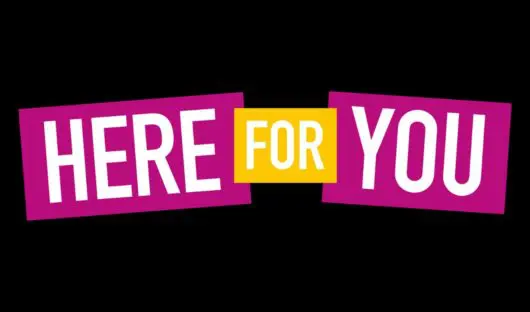Education
Don't let cancer get in the way of learning. The timing is tough whether you’re just starting out, part-way through or wrapping up your education. But there are people and services available to help.

My child’s education
Your child's education when they have cancer.

My student has cancer
Help them to stay engaged with learning and give them continuity amidst the chaos.

Here for You
You can't take the cancer away but you can say "I'm Here for You". Build your own challenge today.
What support can I get?
Support is out there, so make the most of it. Take a look at what school, college or university could offer:
- Recognising you may need time off for hospital appointments and treatment
- Extra time for coursework and extensions to deadlines if you need it
- Access to someone to take notes for you
- Somewhere to leave stuff on campus to lighten your load
- Arrangements for special dietary needs (access refrigerated food or eating extra snacks in class)
- Flexibility in attendance and punctuality to help with hospital visits
- Supervised rest breaks during exams
- Support from teachers during periods you’re away
- Staff awareness of cancer and its impact (your situation can remain confidential).
Do I have rights?
Absolutely. The Equality Act protects disabled people from being treated unfairly. And you automatically meet the Equality Act definition of ‘disabled’ from the day you’re diagnosed.
Under the Act, colleges in England, Scotland and Wales must not discriminate against disabled students. In Northern Ireland you have similar rights under the Special Educational Needs and Disability Order (SENDO).
Your college/university also has to make ‘reasonable adjustments’ (like the list above) so you’re not at a disadvantage. It’s their legal duty.
How do I get support?
Tell your place of education about your diagnosis so they can start putting things in place. It’s your choice if – or even when – you tell people, but doing this early will mean there’s more time to get things organised.
Meet your support staff (aka. learning support advisors, inclusive learning coordinators or disability advisors). You can usually request an initial appointment over the phone or by email, and everything is confidential.
Will I be assessed?
Some colleges and universities will want you to do a needs assessment. This is a face-to-face meeting with someone who understands how to support students with health conditions. They can make extra recommendations to get any additional support you need.
In England, if you have a cancer diagnosis and have a special educational need, you may also have an Education, Health and Care (EHC) assessment. The EHC plan will look at all your education, health and social needs up to the age of 25. This plan can be shared with your place of education so they can provide the necessary support.
If you live in Wales you could be assessed for a statement of educational needs. To find out more about assessments and support in Northern Ireland, head to the NI Education Authority website. Or head to the Enquire website for more information about assessments in Scotland.
Can I get specialist equipment?
If you need specialist equipment while on campus, you should be able to loan it from your college/university.
Extra costs (like employing support workers, note-takers etc.) should be covered in your college or university’s Learning Support budget so you won’t be out of pocket.
If you’re going to university, check out information on Disabled Students Allowance to see if you could be eligible for financial support, specialist equipment and access to support workers.
Check your agreement
Take a look at the legal agreement that sets out your accommodation rights– if you are in a hall of residence or other university accommodation this may be a licence agreement, if you are in private accommodation it may be a tenancy agreement. When doing your research remember that Scotland and Northern Ireland each have separate systems of law to those in England and Wales.
Your agreement is likely to be for a fixed term, but some agreements may give you the right to terminate early. There may be a standard break clause after six months, for example, or a special right of termination if you are formally interrupting your studies. If you are a private tenant in Scotland (i.e. you are not in a hall of residence) you may have the right to terminate on 28 days’ notice.
If you are a joint tenant you should discuss any possible early termination with your fellow tenants, as it could affect them as well, and may only be possible with their co-operation. Sometimes you will be allowed to terminate your agreement early without penalty if you can find a replacement who will take over your accommodation. It may be difficult to find someone like this, but it’s worth considering, and perhaps asking around – or even advertising.
Negotiate
If you don’t have a legal right of early termination then think about approaching your landlord, explaining your situation and asking what they can do. If your accommodation provider is the university itself, or another large organisation, they probably won’t want to be seen as unsympathetic. A private landlord may not feel under this type of pressure, but may well be sympathetic.
Financial Obligations
It’s likely that if you can’t terminate your agreement early, either by right or through negotiation, you will be left with an obligation to pay rent for the remainder of its fixed term.
All debts should be taken seriously, but there are always approaches to handling them and lots of help and advice available. The important thing is not to ignore your debts and hope they will go away.
Get Advice
If you are unsure about any aspect of your situation, you can get advice from Young Lives vs Cancer’s Welfare Advice Service or speak to our team on Live Chat. Other sources of advice include:
• Citizens Advice
• Shelter
• Housing Advice NI (for advice about accommodation in Northern Ireland)
• Stepchange and National Debt Line (for advice about debt).
There may also be a Student Welfare service at your university or college who can provide support.


